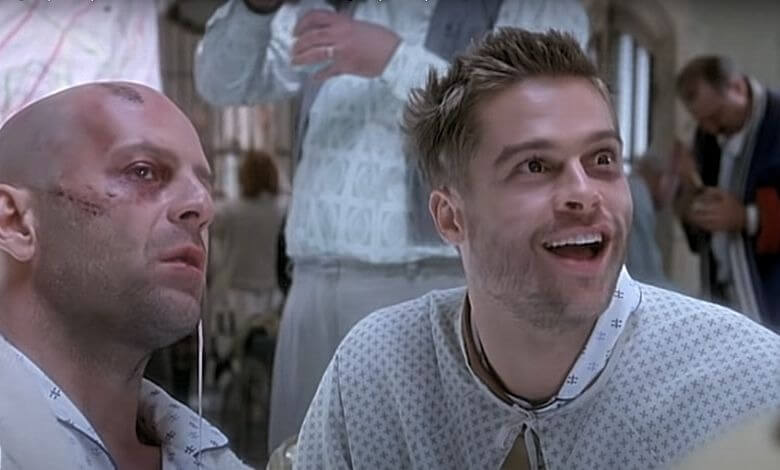Here we are: my fourth and final post on psychological thrillers before I move on to the second half of my film criticism series. Last time, I examined Martin (1977, dir. George A. Romero), a film that also belongs to the vampire genre, and demonstrated how its narrative paints humanity as the true monster. This post will focus on another genre-blending movie, Terry Gilliam’s 12 Monkeys (1995), which is also a science fiction film.
“Maybe the human race deserves to be wiped out.” This morbid realization comes to James Cole, a man from the future, after seeing a rabbit being abused on television. The reason he was sent back in time, the goal that drives the entire narrative of 12 Monkeys, is to save humanity from a virus that decimated ninety-nine percent of the earth’s population, yet here, he ponders if it is really worthwhile. While scientific advancement is typically thought of as a force for positive change, 12 Monkeys suggests that it only brings out the worst in humanity, as evidenced by its depiction of mental health treatment and scientists.
The way in which the treatment of mental health is presented in the film indicates that, while increasing acknowledgement and understanding of mental illness should be a good thing, psychiatry is ultimately used as a means of controlling people. After a confrontation with the police, Cole is institutionalized because of his claims of time travel. Simply for believing something that does not line up with the current scientific understanding, he is placed unwillingy into a facility in which he is essentially a prisoner and is forced to take drugs like thorazine and haldol. These drugs, achievements of chemistry, are used to control his behavior. They make him docile, inhibit his ability to think clearly, and cause him to drool, humiliating and dehumanizing him. In the institution, he meets Jeffrey Goines (Brad Pitt), an unhinged patient who goes on a rant about man’s need to control and exert dominance. He criticizes materialism and the resultant abuse of animals as they are used to test out products. “Buy a lot of stuff, you’re a good citizen,” he says. “But if you don’t buy a lot of stuff… What are you then, I ask you? …Mentally ill.” This directly suggests that mental treatment is used to modify patients’ ways of thinking into those deemed desirable by the capitalists in power. A similar sentiment is later expressed by Kathryn Railly (Madeleine Stowe), a psychiatrist herself, saying of the practice: “…it’s the latest religion. We decide what’s right and wrong. We decide who’s crazy or not.”
Psychiatrists are not the only ones to be put under scrutiny in the film; its representation of other scientists implies that, although the pursuit of science makes us a more advanced species, it exacerbates our (self-)destructive tendencies. The most obvious example is Dr. Peters (David Morse), assistant to Jeffrey’s father, the virologist Dr. Goines (Christopher Plummer). Peters uses his access to Goines’ lab to develop the deadly virus, a true horror of science. Modern virology allows him to commit genocide on a scale that was previously unthinkable. And Dr. Goines isn’t innocent either—his labs perform inhumane testing on animals, something that Jeffrey protests, which is what causes him to assemble the Army of the Twelve Monkeys in the first place. Finally, there is the team of scientists in the future who are trying to undo the viral catastrophe. While their motives are ostensibly pure, their methods are far from it. They force convicts to collect data for them above-ground, where the air could kill them. When they send Cole topside, they tell him that, if his protective suit becomes compromised, he will not be allowed reentry, meaning that they will leave him to die. Furthermore, they test their experimental time-travel technology on these prisoners. This technology is so unstable that, in one scene, they accidentally send Cole to World War I instead of 1996. There, he runs into Jose, (Jon Seda) his neighbor in prison, who presumably has also been sent there by mistake. Both men suffer injuries as a result of this accident, with Cole getting shot in the leg, so these experiments are less than humane, to say the least. All in all, in 12 Monkeys, various types of science that masquerade as being vehicles of benevolence and the good of our kind are used to hurt, control, and kill others.The film begs the question: is our advancement truly making us better, or is it merely amplifying our evils?
And with that, we’ll be segueing into the next focus of this series: science fiction! On deck is Rise of the Planet of the Apes (2011), Rupert Wyatt’s unrelentingly pensive prequel to the 1968 classic. Don’t miss it!


Recent Comments